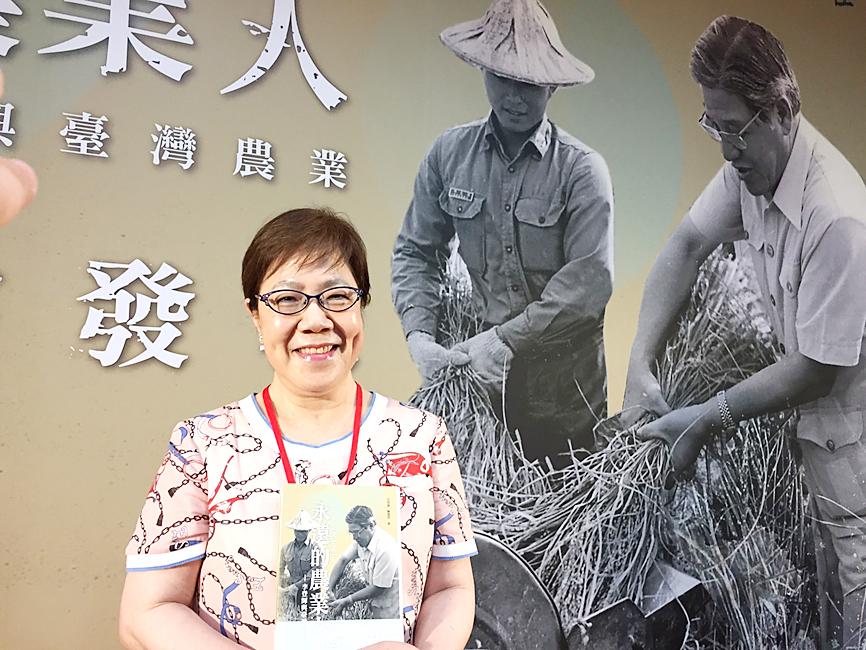Council of Agriculture Minister Chen Chi-chung (陳吉仲) yesterday praised former president Lee Teng-hui’s (李登輝) contributions to the development of Taiwanese agriculture at the launch of Harvest Publications’ new book, Mr Agriculture — Lee Teng-hui (永遠的農業人:李登輝與台灣農業).
The first 50 years of Taiwan’s development are closely related to agriculture, and anyone who wishes to understand it should read the book, Chen said at the launch in Taipei, held on the eve of the second anniversary of Lee’s passing.
Lee’s belief that agriculture was the backbone of the nation is a core value that every agriculture minister cherishes, Chen said, adding that the council, carrying on Lee’s dreams, is pushing for “green agriculture” that would safeguard farmers’ interests while ensuring environmental sustainability.

Photo: CNA
Lee’s policies shed light on why Japanese engineer Yoichi Hatta, known for his contributions to hydraulic engineering in Taiwan, had pushed for the building of the Chianan Irrigation Canal (嘉南大圳), which turned the Chianan Plain (嘉南平原) into the breadbasket of Taiwan, Chen said.
Lee’s devotion to furthering agriculture policies, including farmers’ health insurance and occupational hazard insurance, has deeply affected agricultural policies and are still in effect, he said.
Ikuyo Murashima, head of the Japan-Taiwan Exchange Association’s cultural affairs and public relations department, said Lee introduced to Japan Hatta’s role in the construction of the Chianan Irrigation Canal and its continuing contribution to Taiwanese agriculture.
Taiwanese do not have to thank Japan for such an engineering feat, because Taiwanese themselves took part in its construction, Murashima added.
Taiwanese agriculture is a key factor in building closer relations between Japan and Taiwan, Murashima said, adding that she was confident that the late Lee and former Japanese prime minister Shinzo Abe, who considered Lee a mentor, would be glad to see Taiwan and Japan working together to deepen their friendship.
Separately, the Lee Teng-hui Foundation and Lee’s family yesterday announced that it would donate 2,000 manuscripts of Lee’s speeches and other documents to the Academia Historica.
The Academia Historica is holding a ceremony today to accept the donation.
The documents include valuable manuscripts, such as Lee’s conversation with then-Straits Exchange Foundation chairman Koo Chen-fu (辜振甫) before he visited China in 1998.
Koo’s visit would later be cited as the foundation of the so-called “1992 consensus,” a term that former Mainland Affairs Council chairman Su Chi (蘇起) in 2006 admitted to making up in 2000 — referring to a tacit understanding between the Chinese Nationalist Party (KMT) and the Chinese Communist Party that both sides of the Taiwan Strait acknowledge that there is “one China,” with each side having its interpretation of what “China” means.
Additional reporting by Lee Hsin-fang

POSITIVE DEVELOPMENT: Japan and the US are expected to hold in-depth discussions on Taiwan-related issues during the meeting next month, Japanese sources said The holding of a Japan-US leaders’ meeting ahead of US President Donald Trump’s visit to China is positive news for Taiwan, former Japan-Taiwan Exchange Association representative Hiroyasu Izumi said yesterday. After the Liberal Democratic Party’s landslide victory in Japan’s House of Representatives election, Japanese Prime Minister Sanae Takaichi is scheduled to visit the US next month, where she is to meet with Trump ahead of the US president’s planned visit to China from March 31 to April 2 for a meeting with Chinese President Xi Jinping (習近平). Japan and the US are expected to hold in-depth discussions on Taiwan-related issues during the

‘LIKE-MINDED PARTNER’: Tako van Popta said it would be inappropriate to delay signing the deal with Taiwan because of China, adding he would promote the issue Canadian senators have stressed Taiwan’s importance for international trade and expressed enthusiasm for ensuring the Taiwan-Canada trade cooperation framework agreement is implemented this year. Representative to Canada Harry Tseng (曾厚仁) in an interview with the Central News Agency (CNA) said he was increasingly uneasy about Ottawa’s delays in signing the agreement, especially as Ottawa has warmed toward Beijing. There are “no negotiations left. Not only [is it] initialed, we have three versions of the text ready: English, French and Mandarin,” Tseng said. “That tells you how close we are to the final signature.” Tseng said that he hoped Canadian Prime Minister Mark Carney

President William Lai (賴清德) yesterday bestowed one of Taiwan’s highest honors on Saint Vincent and the Grenadines (SVG) Ambassador Andrea Clare Bowman in recognition of her contributions to bilateral ties. “By conferring the Order of Brilliant Star with Grand Cordon on Ambassador Bowman today, I want to sincerely thank her, on behalf of the Taiwanese people, for her outstanding contribution to deepening diplomatic ties between Taiwan and SVG,” Lai said at a ceremony held at the Presidential Office in Taipei. He noted that Bowman became SVG’s first ambassador to Taiwan in 2019 and

A man walks past elementary school artworks at the Taipei Lantern Festival in Ximen District yesterday, the first day of the event. The festival is to run from 5pm to 10pm through March 15.